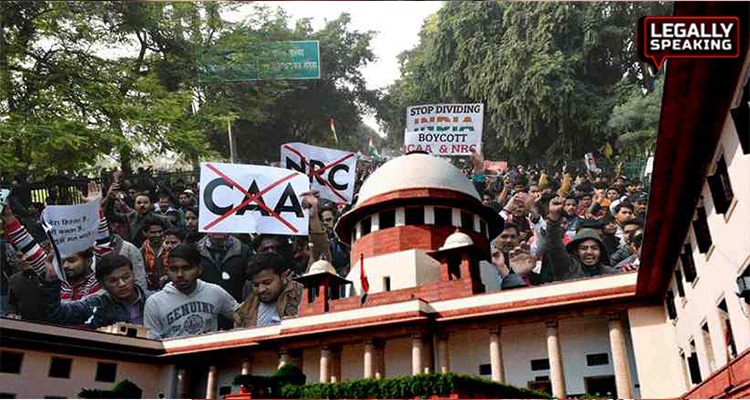
The Supreme Court has scheduled a hearing on March 19 to consider pleas seeking the Centre to halt the implementation of the Citizenship Amendment Rules, 2024 until the apex court resolves the petitions challenging the constitutional validity of the Citizenship (Amendment) Act, 2019.
A bench of Chief Justice of India D Y Chandrachud and justices JB Pardiwala and Manoj Misra acknowledged the arguments presented by senior advocate Kapil Sibal, representing the Indian Union Muslim League (IUML). Sibal contended that once Indian citizenship is granted to migrant Hindus, it cannot be revoked, necessitating an expedited hearing.
“The CAA was passed in 2019. There were no rules at that time, hence no stay was granted… Now, the government has notified the rules ahead of the Lok Sabha polls. If citizenship is granted, then it will be impossible to reverse. So, the interim application may be heard,” Sibal said.
Solicitor General Tushar Mehta, representing the Centre, questioned the locus standi of the petitioners.
“No petitioner has any locus to question the grant of citizenship,” the law officer stated, adding that there were 237 pending petitions against the CAA, with four interim applications seeking a stay on the implementation of the rules.
“We will hear this on Tuesday. There are 190 plus cases. All of them will be heard. We will place a full batch with the IAs (Interim applications),” the CJI remarked.
IUML, a Kerala-based political party, and three other petitioners filed the interim pleas after the Centre implemented the Citizenship (Amendment) Act, 2019 by notifying the rules four years after the contentious law was passed by Parliament to expedite citizenship for undocumented non-Muslim migrants from Pakistan, Bangladesh, and Afghanistan who arrived in India before December 31, 2014.
The application filed by the IUML has sought the court’s direction to ensure no coercive action is taken against people belonging to the Muslim community pending adjudication of the writ petitions. Muslims cannot apply for Indian citizenship under the CAA.
It has urged the apex court to direct the Centre to provisionally permit people belonging to the Muslim community also to apply for citizenship and submit a report on their entitlement.
The Democratic Youth Federation of India has also moved the apex court seeking a stay on the rules.
The IUML has urged the court to stay the “continued operation of the impugned provisions of Citizenship Amendment Act, 2019; and Citizenship Amendment Rules 2024, which would result in valuable rights being created and citizenship being granted to persons belonging to only certain religions, thereby resulting in a fait accompli situation, during the pendency of the present writ petition”.
Seeking a stay on the rules, the application said about 250 petitions challenging the provisions of the CAA were pending before the top court.
“If in case this court finally decided the CAA as unconstitutional, then these people who would have got citizenship under the impugned Act and rules would have to be deprived of their citizenship or stripped of their citizenship, which would create an anomalous situation,” it said.
“Therefore, it is in the best interest of every person to defer the implementation of CAA and impugned rules till this court finally decides the matter,” the application said.
It said the Act was passed in 2019 and the government waited for over four years to notify the rules.
“The government did not consider it as urgent to implement it for the past 4.5 years. Therefore, to wait till the final decision of this court would not affect anybody’s rights or interest,” the application said.
It said the IUML had in its petition itself stated that it was not against giving citizenship to migrants.
“However, its position is that this is a legislation which is based on the exclusion of a religion. Since the CAA discriminates on the basis of religion, it strikes at the root of the concept of secularism, which is the basic structure of the Constitution,” it said.
With the unveiling of the rules on March 11, days ahead of the announcement of the Lok Sabha elections, the Modi government kicked off the process of granting Indian citizenship to persecuted non-Muslim migrants — Hindus, Sikhs, Jains, Buddhists, Parsis, and Christians — from Pakistan, Afghanistan, and Bangladesh.
The rules came into force with immediate effect, according to a gazette notification.
The contentious CAA had sparked protests in various parts of the country in late 2019 and early 2020 over alleged discriminatory provisions.
While refusing to stay the operation of the law, the top court had on December 18, 2019, issued notices to the Centre on the pleas.




